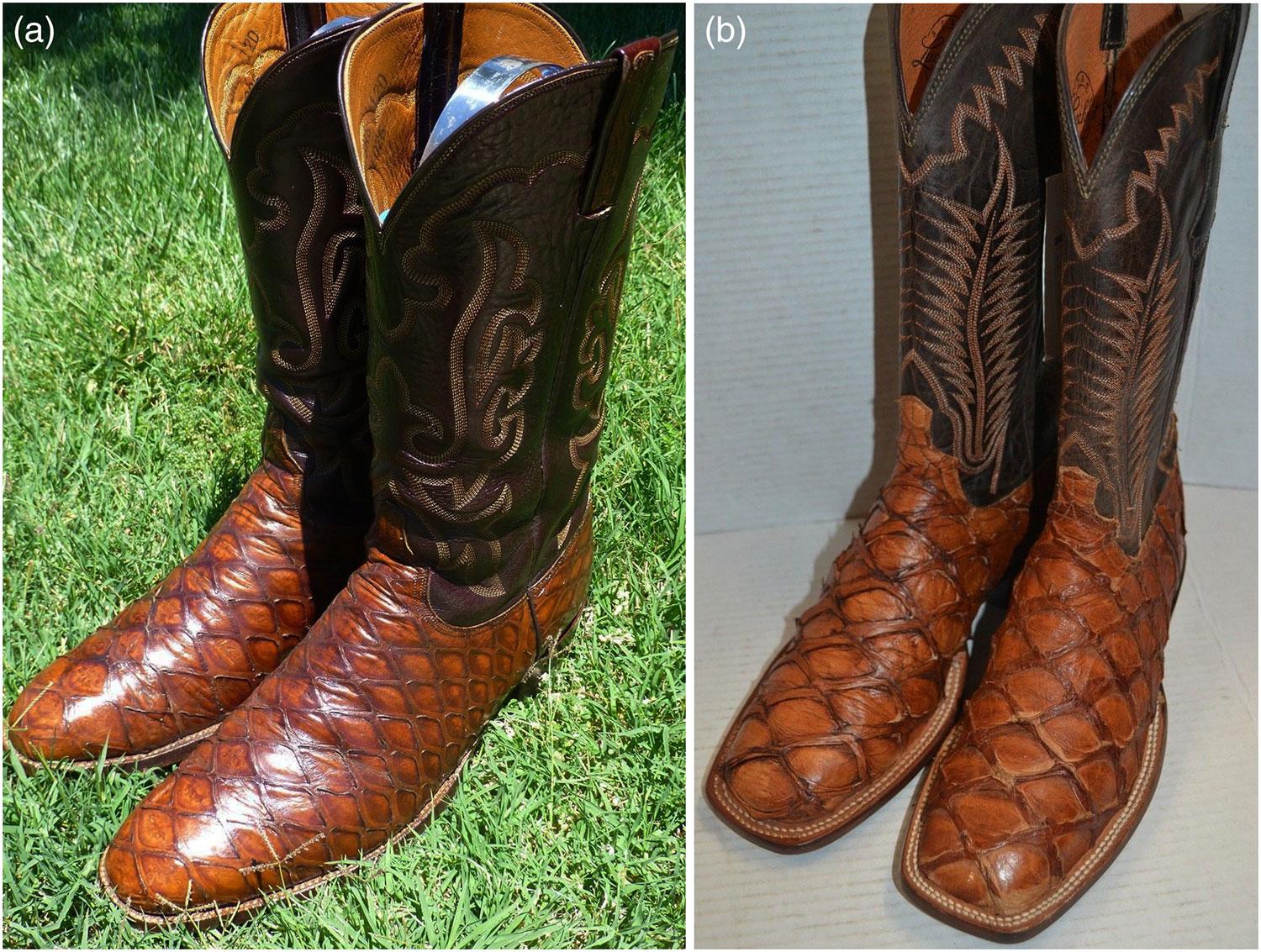No yee-haw: What endangered creature are your cowboy boots made from?
Cowboy boots made from the uniquely patterned skin of endangered pangolins are being substituted by another threatened creature, the arapaima.
Researchers investigating the world’s exotic wildlife trade have made this startling discovery: arapaima leather is being increasingly used to satisfy the persisting demand for exotic leather in the United States.
Arapaima are large freshwater fish native to the Amazon region in South America. Impacted by habitat loss and illegal fishing among other threats, scientists have called for urgent research to determine the impact that increased trade is having on wild populations.
Meanwhile, pangolin populations are still dwindling as a result of being the most illegally trafficked wild mammal in the world.

Example images of leather products advertised on the US eBay website.
The boots in (a) are made from pangolin skin and were advertised as pre‐owned “classic anteater boots” of the brand “Lucchese,” valued at US$1,500 as a starting price and available for international shipping.
The boots in (b) are also Lucchese boots, but made from arapaima skin. These boots were advertised as “New with defects,” valued at US$415.65 as a starting price and also available for international shipping.
Note that Lucchese has stopped manufacturing boots from pangolin skins, but is now using arapaima skins.
“The US has contributed to the decline of pangolin species and was historically a large market for pangolin leather products,” says Sarah Heinrich, PhD candidate in the School of Biological Sciences’ Invasion Science & Wildlife Ecology Group.
“While the US trade in pangolin products has declined since 2000, arapaima leather trade has increased significantly since 2011.
“We suspect that pangolin leather may now be substituted by arapaima products.”
Ms Heinrich and her colleagues at the University of Adelaide found leather items of both arapaima and pangolin origin for sale on eBay, with 75 per cent of incidents in breach of eBay policy, and potentially illegal. 10 per cent of pangolin leather products were falsely advertised as arapaima products.
The researchers learned the US states that were most involved in this trade had a lower population density and were comparatively wealthier than others.
Pangolins (Manis spp.) and arapaimas (Arapaima spp.) are two Convention on International Trade in Endangered Species of Wild Fauna and Flora (CITES) listed genera coveted in the leather fashion industry for their unique skin pattern.
“Illegal wildlife trade is a lucrative business, which is driving many species towards extinction,” Ms Heinrich says.
“The substitution of one taxa by another provides a case‐book example of the complexity and diversity of the highly dynamic trade in wildlife products.
“For example, global pangolin conservation and awareness is increasing, however, arapaimas are also threatened, and have attracted much less attention. These fish were already threatened before any increase in the trade of their skins.
“Consequently, research and conservation action is needed to reduce consumer demand in the US for exotic leather, and promote sustainable use of substitute products.”
“We also need to improve monitoring of arapaima aquaculture and their populations in the wild. If sustainable aquaculture and management could be ensured, and arapaima skins were only obtained as by‐products of the food industry, arapaima leather products may provide a substitution opportunity to reduce demand for ‘exotic’ pangolin leather products.”
CITES is an international agreement between governments which aims to ensure that international trade in specimens of wild animals and plants does not threaten their survival.
Further reading
- Of cowboys, fish, and pangolins: US trade in exotic leather, Conservation Science and Practice




